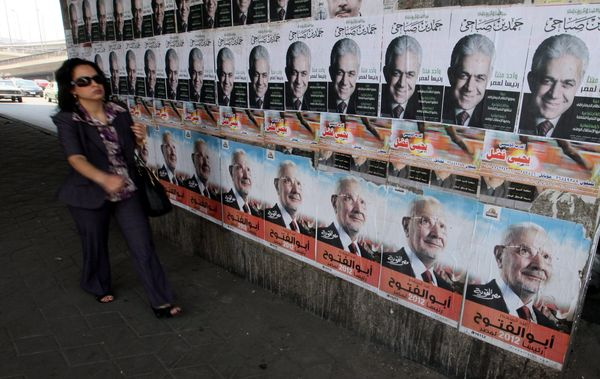Egyptians are voting for the second day in the country’s first free presidential elections – 15 months after Hosni Mubarak was ousted.
Queues are being reported at some polling stations.
The election pits Islamists against secularists, and revolutionaries against Mubarak-era ministers. In all, 13 candidates are running.
The military council which assumed presidential power in February 2011 has promised a fair vote and civilian rule.
On Wednesday, there were large queues in many places, and voting passed off calmly for the most part.
However, protesters in Cairo threw shoes and stones at a convoy of candidate Ahmed Shafiq, who was Hosni Mubarak’s last prime minister.
There were also reports that a group of female voters has been denied access to a polling station in the capital because they were wearing a full face veil.
The US hailed the election, with State Department spokeswoman Victoria Nuland describing it as a “very important milestone” in Egypt’s transition to democracy.
Fifty million people are eligible to vote, and preliminary results are expected over the weekend.

The frontrunners are:
• Ahmed Shafiq, a former commander of the air force and briefly prime minister during February 2011 protests
• Amr Moussa, who has served as foreign minister and head of the Arab League
• Mohammed Mursi, who heads Muslim Brotherhood’s Freedom and Justice Party
• Abdul Moneim Aboul Fotouh, an independent Islamist candidate
Until a new constitution is approved it is unclear what powers the president will have, prompting fears of friction with a military which seems determined to retain its powerful position.
Voting across the country resumed at 08:00 local time. The authorities have declared Thursday a holiday, partly to allow public sector employees time to cast their ballots.
Some Egyptians may have been waiting for a second day of voting to avoid crowds.
On Wednesday, voting was extended by an hour to 21:00 to cater for queues at a number of polling stations.
NGOs and rights groups monitoring the election reported some complaints.
Egypt’s National Council for Human Rights (NCHR) said they received 50 complaints on electoral violations ranging from delay in opening voting booths, to campaigning for candidates outside polling stations during voting.
There was a heavy police and military presence outside the 13,000 polling sub-stations, and the atmosphere was mostly calm, with people waiting patiently for their turn to vote.
Mohammed Mursi was originally the Muslim Brotherhood’s reserve candidate, but he was thrust into the limelight after its first choice, Khairat al-Shater, was disqualified by the Higher Presidential Electoral Commission (HPEC) over an unresolved conviction.
He told reporters: “Today the world is witnessing the birth of a new Egypt. I am proud and cherish my membership of this people. I assure them that tomorrow will be better than today and better than yesterday.”
A run-off vote is scheduled for 16 and 17 June if there is no candidate manages to get more that 50% of the votes.
The Supreme Council of the Armed Forces (SCAF), worried about potential post-election unrest, has sought to reassure Egyptians that it will be the voters themselves who decide who will be the next president.
The 15 months since Hosni Mubarak was forced from power have been turbulent, with continued violent protests and a deteriorating economy.
Foreign direct investment has reversed from $6.4 billion flowing into the country in 2010 to $500 million leaving it last year.
Tourism, a major revenue generator for Egypt, has also dropped by a third.
The new president will have to reform the police to deal with the rash of crime that followed the uprising.
As many as a third of voters were reported to be undecided about which candidate to choose.
The Arab Spring began last year in Tunisia, inspiring pro-democracy activists across the Arab world.
Hosni Mubarak, who was in power for three decades, resigned on 11 February 2011 after 18 days of protests in Cairo and other cities.
He is on trial for his alleged role in the deaths of protesters. A verdict is expected in June.
